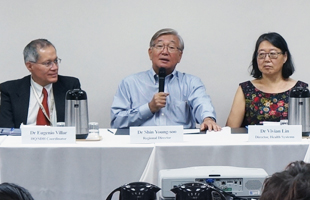
WHO
Leaving no one behind has been recognized globally as the overarching principle of the Sustainable Development Goals (SDGs). It is a critical concern for Member States in the Western Pacific region as they move towards universal health coverage.
Significant health gains have been made in recent decades, but evidence suggests these gains have been unequally distributed and have largely failed to reach the poor and other marginalized or socially excluded groups. Persistent and growing inequities are increasingly evident, both between and within countries.
In response, the WHO Regional Office for the Western Pacific hosted a global meeting and training on the Innov8t approach, a new WHO tool to support Member States in reviewing national health programmes.
"This approach will help us to better address equity, gender, human rights and social determinants of health in our efforts to improve health outcomes in the Region," said Dr Shin Young-soo, WHO Regional Director for the Western Pacific.
Participants in the meeting include global and regional partners and WHO staff from headquarters and all six regional offices. They will discuss and review the Innov8t approach and contribute to WHO’s strategic thinking on how to best advance this important area of work.
Integrating equity, gender, human rights and social determinants of health in health programmes is not easy, but successes and lessons learnt in the Region and globally provide the basis for the next steps.
In his opening remarks, Dr Shin highlighted several successes that offer lessons to build on:
- In Tianjin City in China, more than two out of five men were smokers, while less than one in 30 women smoked. When smoke-free laws in public places went into effect, men increasingly smoked at home. This exposed their families to health risks from second-hand smoke. WHO collaborated with Tianjin City to integrate gender into a project on smoke-free homes and social norms, empowering women to negotiate non-smoking.
- In Viet Nam, WHO collaborated on a study to integrate equity and social determinants of health into national health sector policies and plans. The study informed policy dialogue, drawing attention to the barriers to services faced by marginalized groups.
"In both examples, the integration of equity, gender, human rights and social determinants has helped make health programmes more effective by reaching marginalized groups," said Dr Shin.
The global meeting highlights WHO's steadfast commitment to support Member States in integrating equity, gender and human rights in national health programmes working towards the achievement of the SDGs.

/59748.tmb-300v.png?sfvrsn=9885965b_2)


